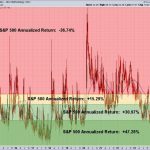Just Another Manic Monday? On Monday, the Nasdaq plunged over 3%. With the S&P 500 dropping a similar amount and the Dow plummeting over 1,000 points (a 2.6% drop), it was the biggest one-day drop since September 2022. Still, Japan’s Nikkei experienced a far more severe decline, plummeting by a staggering 12%; its worst downfall since the infamous Black Monday on Wall Street in 1987.
The main driver? Fears of a potential US recession sparked by the latest disappointing July jobs report. Adding to the worry is that the Federal Reserve may be a little too slow to cut interest rates.
Tech Rebound or Stock Market Mayhem?
The Magnificent Seven’s $714 wipeout Monday played a huge role in sinking the tech-heavy Nasdaq as it makes up over 40% of the Nasdaq 100. Adding to the chaos, a judge ruled against Google’s antitrust practices, and Berkshire Hathaway slashed its stake in Apple.
As the Nasdaq and the broader market bounce back in early Tuesday trading, investors are eyeing the rally and wondering: is this the start of a comeback or just a brief pause before another slide?
To get a clearer picture of the Nasdaq’s price action, let’s zoom out and look at a weekly chart of the Nasdaq 100 Index ($NDX).
CHART 1. WEEKLY CHART OF THE NASDAQ 100. Despite the severity of Monday’s drop, the longer-term uptrend seems intact.
The range of Monday’s drop (see blue circle on the right) was far greater than most weekly ranges, and this was on a single day.
But as you can see, the candle appears to have reversed the initial drop, bouncing off the 50-period simple moving average (SMA); the longer-term uptrend is intact.
But what if the Nasdaq were to drop further? Which levels might be prime buying opportunities, and which might scream “stay away”? Let’s switch to a daily chart of Invesco QQQ Trust ETF, a Nasdaq 100 proxy.
CHART 2. DAILY CHART OF QQQ. Momentum is weak, but indications of potential support for further downside movement are clear.
You can see the QQQ bounced off the 200-day SMA, which aligns closely with the weekly chart’s bounce off the 50-period SMA. The uptrend appears undisturbed by the recent selloff.
Keep an eye on momentum via the Chaikin Money Flow (CMF); it’s still in the “selling pressure” zone. If it doesn’t turn around, the rebound might lack the momentum to sustain itself.
But if market sentiment and fundamental factors cause the QQQ to decline in the coming sessions, the range between $350 and $380 marks critical levels of potential support for the following reasons:
- If the fundamental environment leans more bullish than bearish, the 50% to 61.8% Fibonacci retracement range constitutes an optimal entry point for those looking to buy the bounce.
- This range is a concentrated hotspot for trading activity, as shown by the Volume-by-Price indicator, and aligns with a strong support level near $350, tested four times during summer and fall 2023 (see black rectangle). A drop below $350 can lead to more downside. So, keep $350 in mind as the key level where any bullish outlook might need a rethink.
What Are Analysts Saying?
It’s mixed.
- JPMorgan: Think there’s a 50% chance of a recession. They expect the Fed to cut rates by 50 basis points in September and again in November (if not an earlier emergency cut).
- Morgan Stanley: Playing it safe, they note the market’s seasonal weakness and doubt a second-half recovery. They see lower equity valuations and a bearish outlook in the short term.
- Nomura: More upbeat than the rest, they see the “correction” as a buying opportunity as long as the Fed proceeds with rate cuts. Overall, they’re betting on the AI boom to continue fueling tech growth.
- UBS: They see the current Volatility Index (VIX) action as a signal for a potential buy, but they also warn that there may be more downside risk.
Closing Trade
After Monday’s market mayhem, the Nasdaq is trying to reverse its drop, but analysts’ forecasts are split. While price action suggests a bold upside rebound, momentum indicates weakness in the bounce. Ultimately, the Nasdaq’s direction will hinge on market sentiment and the Fed’s moves. If short-term weakness drags the QQQ lower, keep an eye on the key levels mentioned above.
Disclaimer: This blog is for educational purposes only and should not be construed as financial advice. The ideas and strategies should never be used without first assessing your own personal and financial situation, or without consulting a financial professional.



